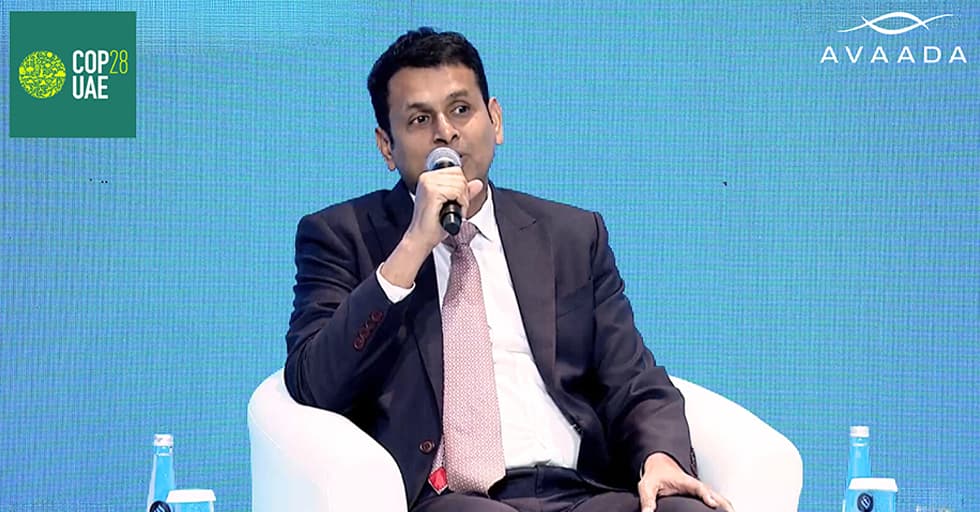As the curtains draw on the COP28 UAE, the international community can collectively breathe a sigh of relief and celebrate what can only be described as a historic success in the ongoing battle against climate change. The summit, being held in Dubai over the past 11 days, brought together leaders, experts, and activists from around the world to address the pressing issues surrounding climate change. In this blog post, we’ll delve into why COP28 is being hailed as a monumental success. One of the key indicators of COP28’s success is the unprecedented level of global unity and commitment demonstrated by the participating nations. The summit saw representatives from virtually every corner of the globe coming together, setting aside political differences to focus on the shared goal of mitigating climate change. This spirit of collaboration and collective responsibility is a testament to the growing recognition of the urgent need for coordinated action. As I reflect on the whirlwind of these 11 days, here are the pivotal insights that have emerged.
DAY 1:
The tone for the entire week was set on Day 1, as the mobilization efforts kicked off, showcasing a global commitment to combating climate change. The highlight of the week was the historic replenishment of the Green Climate Fund, totaling a monumental $12.5 billion. Additionally, the establishment of the Loss and Damage Fund, with initial pledges exceeding $720 million, underscored the collective determination to address the real and immediate impacts of climate change. From the outset, COP took a positive turn with a focused effort on mobilizing finance for the Loss and Damage Fund. This early emphasis on concrete actions demonstrates a commitment to making tangible progress in the fight against climate change. The urgency of addressing loss and damage was not lost on the participants, and the momentum continued to build throughout the week. One remarkable aspect of COP was the unprecedented participation from the private sectors, which was arguably the highest seen in any previous conference. The involvement of businesses and industries signals a major milestone, highlighting the increasing recognition of the private sector’s role in driving sustainable practices and contributing to global climate goals. This engagement is crucial for achieving meaningful and scalable solutions to climate challenges. Additionally, a noteworthy conversation that resonated throughout the conference was the role of youth as advocates for climate protection. Delegates discussed the importance of instilling environmental awareness in younger generations, as they are seen as key players in driving significant changes in the future. The notion that children must become advocates for climate protection underscores the urgency of nurturing a sense of responsibility and environmental consciousness from an early age.
DAY 2:
Day 2 of the Conference of Parties-28 (COP28) summit witnessed a flurry of impactful announcements and significant strides towards a sustainable future. The world leaders gathered in Dubai, including Prime Minister Narendra Modi, COP28 President Sultan Ahmed Al Jaber, and UK Prime Minister Rishi Sunak, addressed critical issues and unveiled ground-breaking initiatives aimed at combating climate change. Indian Prime Minister Narendra Modi marked his presence at the World Climate Action Summit, concluding his day-long visit to the United Arab Emirates with a momentous announcement—the launch of the Green Credit Initiative. This initiative represents a landmark declaration for environmental upliftment, introducing green credits assigned to specific eco-friendly activities. These credits will be tradable commodities, creating a pathway for environmentally conscious initiatives to thrive in the market. Alternatively, COP28 President Dr. Sultan Al Jaber used the platform to call upon the oil and gas industry to eliminate methane emissions by 2030 and align with net-zero goals by 2050. Recognizing the importance of reducing carbon intensity in global hydrocarbon usage, he emphasized the need for inclusive energy transition and climate justice. This decision reflects a crucial step towards a cleaner and more sustainable energy landscape. UK Prime Minister Rishi Sunak took centre stage with a financial commitment of 1.6 billion pounds for climate projects, aligning with the goals set by the Paris Agreement. This substantial pledge underscores the significance of financial support for climate initiatives and the collective responsibility of nations to achieve global climate targets. Moreover, the discussions at COP28 were characterized by a shared determination to aggressively pursue the aim of limiting global temperature rise to 2 degrees Celsius. With the unfortunate realization that we have already crossed the 1.5-degree mark, leaders engaged in robust conversations to accelerate efforts and implement policies that would contribute to a greener, more sustainable future. The summit also presented a unique opportunity for developing nations at the forefront of climate change to make their voices heard. It went beyond discussions on equity and funds, emphasizing the importance of building capabilities to invest in green technology and infrastructure. Nations were called upon to take accountability for their actions, fostering an atmosphere of collaboration rather than engaging in blame games. My takeaway: As the world transitions from fossil fuels to predominantly renewable sources, there is a growing recognition of the need to transform electrons into molecules for efficient transportation and to meet the increasing demands for energy. COP28 Day 2 saw key decision-makers uniting to set up ground-breaking policies and initiatives, signifying a collective commitment to combating climate change and creating a sustainable future for generations to come.
Day 3:
The third day was focused on the focal point shifted to the World Climate Action Summit, where nations converged to chart a course toward a sustainable and climate-resilient future. One of the pivotal moments came with the signing of the Global Renewables and Energy Efficiency Pledge by 117 nations. This ground-breaking commitment aims to triple global renewable energy capacity to an ambitious 11,000 GW by 2030, coupled with a pledge to double annual energy efficiency improvements to 4%. Simultaneously, a significant stride was taken as twenty countries joined forces to commit to tripling nuclear energy capacity by 2050. The Declaration to Triple Nuclear Energy underscores a shared vision for a diversified energy portfolio, with a noteworthy initiative known as “Double Down Triple Up” taking center stage. A notable player in the climate action arena, the United Arab Emirates (UAE), made headlines by launching ALTÉRRA, a formidable $30 billion climate fund. This groundbreaking initiative allocates $25 billion towards climate strategies, signaling a robust commitment to mitigating the impacts of climate change. Additionally, $5 billion from ALTÉRRA is earmarked to stimulate Global South investments, providing crucial support to developing nations in their pursuit of sustainable development. The commitment to reducing greenhouse gas emissions received a boost as the United States Environmental Protection Agency (EPA) issued a final rule aimed at sharply reducing methane and other harmful pollutants originating from the oil and natural gas industry. This regulatory move underscores the importance of international collaboration in addressing the urgent need for emissions reductions. Additionally, echoing sentiments shared by global leaders, including António Guterres, there is a growing consensus that achieving the 1.5-degree Celsius limit is contingent on a radical shift in our approach to fossil fuels. He also emphasized the need to move beyond mere reductions or abatements, stressing the imperative to phase out fossil fuels entirely, with a clear timeframe aligned with the 1.5-degree Celsius target. Moreover, a call to action reverberates through the summit, urging countries to expedite their net-zero timelines. Developed nations are urged to achieve net-zero emissions by 2040, while emerging economies are encouraged to do so by 2050. The emphasis lies not just on achieving net-zero status but doing so through a “just, equitable transition” to renewable energy. This signifies a commitment to ensuring that the transition is inclusive, leaving no one behind and addressing the social and economic dimensions of climate change. My Takeaway: In the face of mounting urgency, the prevailing sentiment is clear: time is running out, and decisive action is imperative. The collective commitment displayed at COP28 underscores the global recognition that the climate crisis requires immediate and concerted efforts. The agreements forged and initiatives launched pave the way for a sustainable and resilient future, emphasizing that the time to act is now.
Day 4:
This day marked the debut of Health Day- the first time at COP. It included programming that showcased the links between the impacts of climate change on human health and methods for identifying and scaling adaptation measures to address these impacts as it is estimated that around 250,000 deaths per year will occur in the next decade because of climate change. The imperative to accelerate the development and deployment of climate technologies took centre stage at the conference. Delegates engaged in discussions that emphasized fostering innovation, facilitating knowledge transfer, and ensuring that climate technology is accessible and affordable for all nations. This emphasis on inclusivity is crucial to fostering a global collaborative effort to address climate challenges. A key highlight of COP28 was the unveiling of the Energy Transition Accelerator (ETA), a transformative collaboration spearheaded by the U.S. Department of State and several other noteworthy organizations. The ETA is poised to be a game-changer in the quest for a sustainable energy transition, serving as a catalyst for unleashing private capital to propel swifter energy transitions in developing economies. Multinational corporations have shown keen interest in supporting the energy transition through this innovative carbon finance platform, indicating a promising avenue for private sector involvement in sustainability efforts. In recognition of the importance of accountability in climate action, COP28 saw the launch of a taskforce dedicated to Net-Zero Policy. This initiative is aimed at ensuring the credibility and accountability of net-zero commitments made by nations. By fostering transparency and a robust framework for monitoring progress, the taskforce aims to instil confidence in the global community regarding the seriousness and effectiveness of net-zero efforts. Addressing the loss of biodiversity emerged as another critical focus at COP28. Discussions revealed that addressing nature loss not only holds the potential to save $104 billion in adaptation costs but could also contribute significantly to CO2 mitigation action. With the capacity to provide upwards of 30% of the needed CO2 mitigation action by 2030, focusing on nature conservation emerges as a cost-effective and impactful strategy in the fight against climate change.
Day 5:
Amidst the bustling activity of COP28, a day of pivotal developments unfolded, signalling both challenges and opportunities in the global pursuit of sustainable environmental practices. One of the standout moments was the bold pact signed by 22 nations, committing to triple nuclear power by 2050. This move underscores a paradigm shift, positioning nuclear power not as an alternative but as an indispensable partner alongside renewables. With nuclear power constituting 10% of the current 370 GW capacity, these nations recognize its crucial role in diversifying the energy mix and meeting the growing global demand for clean energy. Additionally, a sense of urgency permeated the conference as the World Meteorological Organization (WMO) issued a stark warning. The period from 2011 to 2020 set a scorching record, marked by an alarming increase in high temperatures, unprecedented rates of glacier melt, and a staggering 75% loss of mass in the Antarctic ice sheet. This urgent call to action emphasizes the need to nurture and heal our planet, compelling nations to intensify efforts in combating climate change. The sobering reality of climate change was also further underscored by the revelation that each decade since the 1990s has been warmer than the previous one. This alarming trend serves as a red alert, emphasizing the critical need for decisive and immediate action to mitigate the impacts of climate change. Trade policies also came under scrutiny as discussions revolved around aligning them with climate objectives. The imperative to mobilize private sector investments for sustainable initiatives took precedence, emphasizing the crucial role that businesses play in the transition to a low-carbon economy. The call for a just transition highlighted the need to ensure that workers and communities are not left behind in the pursuit of environmental sustainability.
Day 6:
In a landmark move, the United Arab Emirates (UAE) has launched a $30 billion clean energy fund, signalling a significant commitment to combating climate change. This initiative comes on the heels of a broader push for green financing, with banks setting their sights on a staggering $270 billion investment in sustainable projects. Projections indicate that the climate tech market is poised to soar to $2 trillion by 2040, reflecting a growing global awareness of the urgent need for sustainable solutions. Finance took the limelight in the global effort to combat climate change. Developed nations have pledged to increase climate finance to their developing counterparts, with a specific focus on adaptation and resilience. A notable initiative involves mobilizing $100 billion annually by 2025, representing a significant step toward achieving the ambitious goals set forth in the Paris Agreement. Additionally, the financial landscape of climate tech is at the forefront of discussions, with a realization that both public and private climate finance must nearly sevenfold increase by the end of the decade to meet crucial climate objectives. Currently, investors are playing a pivotal role in the $0.8 trillion climate tech sector, yet only 10-15% of them demonstrate a positive business case. This underscores the importance of aligning financial interests with the broader goals of environmental sustainability.
Day 7:
This day was like a bullet train to speed up climate action and emphasized the shift to eco-friendly and resilient infra, especially in urban areas, with a key focus on multilevel action, urbanization, and the built environment and transport. This is crucial as cities contribute approximately 75 percent of global CO2 emissions, mainly from transportation and buildings. A significant highlight of Day 7 was also the emphasis on reshaping urban areas to mitigate climate change. Cities contribute a staggering 75 percent of global CO2 emissions, primarily from transportation and buildings. COP28 discussions delved into the importance of multilevel action, recognizing that addressing climate challenges requires collaborative efforts at local, regional, and national levels. The spotlight on the built environment and transport sectors underscored the pivotal role urbanization plays in achieving sustainability goals. Sustainable Aviation Fuel emerged as a key focus, highlighting the aviation industry’s commitment to reducing its environmental footprint. Discussions catered on the need for innovative solutions to propel the sector toward a more sustainable future. Moreover, India showcased its dedication to energy independence and a cleaner, greener future during COP28. The focus on green hydrogen as a catalyst for a carbon-free future exemplifies India’s commitment to sustainable energy solutions. Green hydrogen, along with its derivatives such as Green Methanol and Green Ammonia, took center stage as part of India’s strategy to drive transformative change in its energy landscape.
Day 8:
This day infused the conference with renewed energy and a shared sense of purpose. The UAE’s Food Fund emerged as a beacon of hope, directing private sector investments to revolutionize food and agricultural systems in developing nations. Through innovative bond structures, the initiative aims to accelerate sustainable practices and empower local communities, marking a significant stride toward global food security. In parallel, the Collective for Clean Transport Finance unveiled an ambitious plan to fund “lighthouse projects” for zero-emission vehicles in key cities worldwide. By deploying electric buses and vehicles, this initiative seeks to showcase the economic potential of clean transportation, offering a transformative path toward a healthier planet. The day also witnessed a strong emphasis on mobilizing financial resources to support developing nations in their transition to clean energy and climate-resilient economies. Discussions explored innovative financing mechanisms, including green bonds and climate funds, emphasizing the global commitment to addressing climate change collectively. In summary, Day 8 of COP28 epitomized optimism and innovation, with tangible solutions like the UAE’s Food Fund and the Collective for Clean Transport Finance pointing toward a sustainable future. As financial strategies gain momentum, the world stands united in the pursuit of a cleaner, greener, and more resilient planet.
Day 9:
At the heart of Day 9, COP28 reached its ninth day, attention was driven on the pivotal debate over fossil fuels, specifically the choice between phase-out and phase-down. The outcome holds significant sway, influencing global climate goals, investment choices, and policy frameworks. Additionally, the COP28 Presidency and Saudi Arabia jointly launched the Oil and Gas Decarbonization Charter (OGDC), a global industry initiative geared towards expediting climate action within the oil and gas sectors. A substantial $57 billion has already been mobilized for climate action, signalling a positive step forward. However, the need for additional funding remains critical to achieving overarching climate goals.
Day 10:
This day was a concoction of advancements, apprehensions, and optimism. Adding to the positive momentum, a new $1 billion fund was launched, emphasizing the international community’s dedication to combatting the illegal wildlife trade and safeguarding endangered species. These crucial steps highlight the global determination to protect biodiversity and preserve our planet’s delicate ecosystems. However, amid these advancements, negotiations on Article 6—critical for shaping carbon trading rules under the Paris Agreement—remain in a deadlock. Disagreements persist on fundamental issues such as accurately measuring emissions reductions, concerns about double counting emissions, and the role of non-market approaches like sustainable land management in implementing Article 6. As the discussions continue, finding common ground on these complexities becomes paramount for advancing global climate goals. The delicate balance between progress and challenges underscores the intricate nature of navigating climate negotiations on the world stage.
Day 11:
This day could probably be called the day of progress and challenges. This day highlighted the critical need for immediate and impactful solutions to combat climate change took centre stage. The urgency surrounding this global challenge infused the ongoing negotiations with a renewed vigour, emphasizing the pivotal importance of translating discussions into tangible outcomes. Amidst the challenges that linger, a palpable sense of hope permeated the atmosphere. This optimism found its roots in the progress achieved thus far, the collaborative spirit evident in the discussions, and the unwavering commitment to address the climate crisis collectively. Despite the hurdles, Day 11 instilled a belief that a positive conclusion is within reach, fueled by the determination to transform words into actions on the critical path towards a sustainable future.
As COP28 draws towards its conclusion, the collective spirit to address climate change has not waned; if anything, it has grown stronger. Day 11’s emphasis on urgency, practical implementation, and a glimmer of hope signifies a turning point in our global commitment to combatting the climate crisis. While challenges persist, the discussions and progress made during this conference instill confidence in our ability to forge impactful solutions. The shared dedication, collaborative ethos, and the acknowledgment of the critical need for immediate action paint a promising picture for the future. As the world unites in the fight against climate change, there is a prevailing optimism that the decisions made, and the commitments undertaken at COP28 will pave the way for a more sustainable, resilient, and hopeful tomorrow. It is a reminder that, even in the face of adversity, our collective resolve can indeed shape a positive trajectory for our planet.









